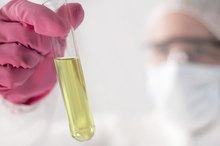Grapefruit Juice & Kidney Stones
Abdominal pain, nausea, vomiting, fever and chills are just a few of the symptoms associated with kidney stones. If you have ever received a kidney stones diagnosis, you are among the 10 percent of Americans who have had to deal with this painful condition. Orthophosphate medications can reduce your chances of having another kidney stone attack -- avoiding grapefruit juice may also help.
What are Kidney Stones?
Several types of kidney stones occur when you have too much calcium, uric acid, oxalate or other mineral substances in your urinary tract. The excess substances combine and form hard, crystalline deposits that block urine flow inside your kidneys. The blockages produce kidney swelling and extreme pain that intensifies as the condition persists. According to PubMed Health, calcium stones are the most common type of kidney stones, usually occurring in men and women between the ages of 20 and 30 1.
- Several types of kidney stones occur when you have too much calcium, uric acid, oxalate or other mineral substances in your urinary tract.
- The blockages produce kidney swelling and extreme pain that intensifies as the condition persists.
Citric Acid
Normal Urinary Output for an Adult
Learn More
Citric acid, a bitter acid contained in fruits, reduces the development of kidney stones in some patients. In fact, the North Carolina University Cooperative Extension explains that increasing your intake of orange juice and lemon juice, which contains ample amounts of citric acid, can help prevent kidney stones from developing in the urine. Despite the fact that grapefruit juice contains citric acid, regular consumption may actually increase your risks of developing kidney stones. The reasons why are unclear.
- Citric acid, a bitter acid contained in fruits, reduces the development of kidney stones in some patients.
- In fact, the North Carolina University Cooperative Extension explains that increasing your intake of orange juice and lemon juice, which contains ample amounts of citric acid, can help prevent kidney stones from developing in the urine.
Inconclusive
The research as to why grapefruit juice increases the risk of kidney stones is inconclusive. However, researchers do know that people who consumed 8 oz. of grapefruit juice every day increased their chances of developing kidney stones by 44 percent during a period of eight years, according to a study published in the December 2005 issue of “Urologic Nursing.” The jury is still out on whether or not grapefruit juice is a direct cause of kidney stones or whether ingesting grapefruit juice produces a chain reaction of effects that results in the development of kidney stones 2.
Water
Risks of Too Much Vitamin D3
Learn More
When it comes to reducing your chances of developing kidney stones, grapefruit juice may be out, but water is in. The University of Illinois at Urbana-Champaign reveals that if kidney stones are a common occurrence, drinking six to eight glasses of water every day may increase your urine output enough to discourage crystalline deposits from developing 3. Increasing your daily water intake will also dilute your urine, making it difficult for kidney stones to form.
Related Articles
References
- “Urologic Nursing”; The Role of Diet in the Prevention Of Common Kidney Stones; Christy Krieg; December 2005
- National Institutes of Health. Eating, Diet & Nutrition for Kidney Stones. Updated May 2017.
- Cereda M, Kennedy S. Cereda M, Kennedy S Cereda, Maurizio, and Sean Kennedy.Chapter 61. Anesthetic Considerations for Genitourinary and Renal Surgery. In: Longnecker DE, Brown DL, Newman MF, Zapol WM. Longnecker D.E., Brown D.L., Newman M.F., Zapol W.M. Eds. David E. Longnecker, et al., eds. Anesthesiology, 2e. New York, NY: McGraw-Hill; 2012.
- Hwang JQ, Poffenberger C. Hwang J.Q., Poffenberger C Hwang, James Q., and Cori McClure Poffenberger.Chapter 10. Renal and Urinary System Ultrasound. In: Carmody KA, Moore CL, Feller-Kopman D. Carmody K.A., Moore C.L., Feller-Kopman D Eds. Kristin A. Carmody, et al., eds. Handbook of Critical Care and Emergency Ultrasound. New York, NY: McGraw-Hill; 2011.
Writer Bio
Jonae Fredericks started writing in 2007. She also has a background as a licensed cosmetologist and certified skin-care specialist. Jonae Fredericks is a certified paraeducator, presently working in the public education system.









